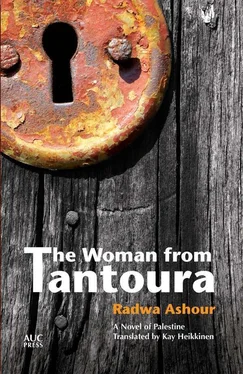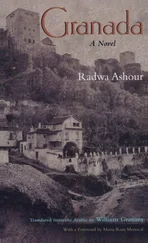I wanted to occupy myself with the plants; they enticed me, and I gave in to temptation. I would water them, turn over the dirt, feed them with fertilizer, clean their leaves, and think about them. I missed the almond tree, and in the spring I missed it more. Sometimes I would think about what I was doing and mock myself; then I would murmur, “It’s not bad, not bad at all.”
Sometimes I would be gripped by flower fever; I would look for stores and buy, arranging them in vases and distributing them throughout the house. There are beautiful flowers in Egypt. There was a strange, elegantly shaped flower I had never seen before: its long stalk ended in something that looked like the head of a swallow, with a crest on the head made of upstanding petals, yellow and orange, surrounding one or two petals of violet color. I asked about its name, and when the salesman said, “bird of paradise,” I loved it more. I take the bird of paradise home with me, in season, and sometimes the damask rose, which I prefer red. Sometimes carnations catch my eye, and I buy them. I do not buy lilies; they aren’t like the lilies in Tantoura, their scent is different, and I don’t like them. I don’t like expensive vases, either, nor vases of colored or decorated pottery. I avoid vases that attract the eye; what would be the point of the flowers, then? I put them in glass containers, ordinary jars like the ones where I put olives or coffee beans or sugar.
When I’m engaged in tending the plants I think of nothing else. I water them, I turn over the dirt, I wipe the dust from their leaves. I transfer a plant that has outgrown its pot to another, bigger one, where it can grow comfortably. I talk to the plants, I always talk to them, encouraging them in their behavior or scolding them for it. “Just look at you, what’s all this, don’t tempt the evil eye!” Or I scold the sluggish one for her laziness: “You silly thing, look at your neighbor, it’s grown leaves and flowered and become twice your height!” Maryam comments that I’m behaving like a schoolteacher with young pupils. I find the comparison odd, and ask, “How so?” She laughs.
The plants preoccupy me. When I go to bed I think about them and about my relationship to them, and say to myself, “A garden in prison, why not? No harm done.”
Less than a week after we arrived in Alexandria I saw Abu Ammar at the White House shaking hands with Rabin and Perez, with Mahmoud Abbas on his left and the American president in the center. They had signed the Oslo Accords. Moments after the end of the live television broadcast of the White House event Sadiq telephoned. He said, “What has the old one done? The sole legal representative eliminated the coast from the agreement. Who represents Tantoura, then? Who represents Safad and Tiberias and Galilee and Haifa and Jaffa and Ramla and the Negev? Who represents Acre and Nazareth? Who represents us?” He was angry. He commented bitterly about Abu Ammar’s insistence on shaking hands with Rabin and Perez, and their avoidance, as if they were condescending to shake hands. “What a farce, what an insult!” No sooner had I hung up than the telephone rang again. This time it was Abed on the other end. He swore and cursed, and as usual he spared no obscene expression, he used them all. Hasan did not call, and I knew that he was nursing his grief in his own way, shrinking like a wet dove chick. I called him. “What do you think, Hasan?” I asked. “It will take a long time, Mother. It will take a long time.”
Hasan was right. In Alexandria, over the same telephone, from the very same seat and over the same television set I would follow the news of the Hebron massacre, the killing of Rabin and his funeral, and Abu Ammar’s insistence on offering his condolences. He bent over the widow’s hand and kissed it; I saw him. Then the events of the new Israeli incursion into South Lebanon, the Cana massacre, the funeral of the martyrs. I followed in silence, repeating Hasan’s expression. “It will take a long time,” I mutter.
I called Wisal in Jenin. Her voice comes over the phone and dispels some loneliness, or some lump in the throat that was about to choke me.
I continue to write because Hasan asks how far I’ve gotten, how much I’ve accomplished. He asks every time we speak. Sometimes the telling seems simple, it flows easily and the words are written as if of their own accord. Or it’s a pleasure, as I relive some intimate or lovely moment with the children or Uncle Abu Amin. It’s as if I summon them and they come, and fill the house for me. Then I stop; the writing is hard, and weighs me down. It seems like a weight of iron that I’ve placed on my chest of my own free will. Why, Hasan? I don’t have to obey you, I can stop; why do I obey? I sit in front of the notebook and look at an empty page, open like an abyss. The writing will kill me, I told you that, Hasan. He said, “Writing does not kill.” Why does he seem so confident?
I flee to the plants, to the sea. I suddenly decide that the window glass is dirty and makes the house dark, separating me from the sky. I bring the ladder and a rubber squeegee and both the short-handled scrub brush and the other one with a long handle, and a bucket of water and soap. I wipe the glass with the cleaning liquid and rub it well, polishing it. I dry it with the squeegee. I don’t look up until Maryam comes home. She says, “Oh no, just a week ago you cleaned all the windows in the house and washed the glass.” I say, “Just a moment, by the time you heat supper I’ll have finished.”
Hasan called me and told me that he was sending me two copies of his new book, “one for you and the other for Maryam.”
A moment of silence, and then: “It’s not a study or a research work, Mother. It’s a novel.”
“A story?”
“Yes, a story.”
I was amazed, and even more amazed when the book arrived. Unlike his previous books, it was small in format and size, ninety pages at most. He said that it was about the attack on Lebanon. How? Is it possible to tell what happened in these few pages? How could a small book, or a large one, bear thousands of corpses, the extent of the blood, the quantity of rubble, the panic. Our running for our lives, wishing for death. Anyway, New Jersey , what was this strange title? What relationship did it have to what happened in Lebanon? Does he speak about his father in his novel? Does he set aside a larger place for Acre Hospital, or does the whole novel center on what happened in Acre Hospital? Does he talk about Beirut, or write about Sidon and Ain al-Helwa, did he listen to the details from his uncle Ezz? I don’t know much about stories and novels; before that I had only read the two stories by Ghassan Kanafi that Ezz lent me in Sidon. I no longer remember more than the title of the short story: “The Land of Sad Oranges.” The longer story was about three Palestinians who wanted to be smuggled into Kuwait, so they hid in the empty tank of a water truck. The border employees delayed the driver so the three died of suffocation, without daring to knock on the sides of the tank.
I was preoccupied with Hasan’s book all day long, but I did not try to page through it or read any of its paragraphs. At night I sat in the seat next to the bed and opened the book, and read. I did not sleep until I had finished it.
The novel centers on a battleship named New Jersey . It was an amazing seagoing vessel, the size of three soccer fields put together, 887 feet long, forty-five tons, and as high as a seven-story building. Its main battery had nine canons, all sixteen inch, and its secondary battery had twenty smaller canons. Each of the large ones shoots missiles weighing 1,200 kilograms, with a range of thirty-seven kilometers. As for the smaller canons, they can reach fourteen kilometers.
Читать дальше












